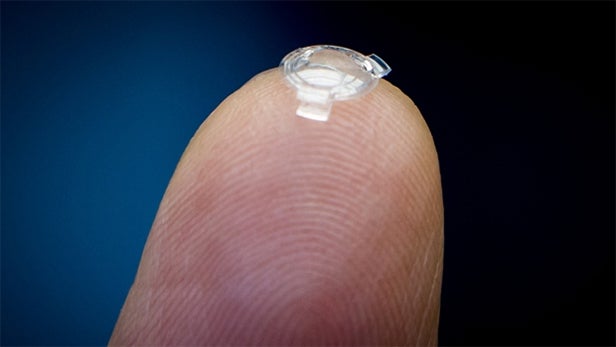Forget 20/20 vision, bionic lenses are set to make super sight a reality

Vision is a tricky hurdle for many of us, but a new technology could turn all of us into optical superheroes.
Dr Garth Webb, an optometrist in British Columbia, has developed a new lens that could give individuals perfect vision, and then some.
According to Webb, his ‘Ocumetics Bionic Lens’ can improve vision to three times better than the 20/20 vision standard, as reported by CBC.
The doctor claims you would be able to achieve perfect vision ‘no matter how crummy your eyes are’.
“This is a vision enhancement that the world has never seen before,” explained Webb.
He continued: “If you can just barely see the clock at 10 feet, when you get the Bionic Lens you can see the clock at 30 feet away.”
The inserts, which replace the eye’s natural lenses, are implanted through a painless procedure that takes approximately eight minutes.
The small, folded, custom-made lenses are surgically inserted into the eye using a saline-filled syringe, which then unravel within about ten seconds.
Once completed, patients of any age will have acquired better vision than would be possible through any other method.
Webb claims the work stems from his ‘obsession’ with freeing people from glasses, saying: “
He explained: “At age 45 I had to struggle with reading glasses, which like most people, I found was a great insult. To this day I curse my progressive glasses. I also wear contact lenses, which I also curse just about every day.”
“Perfect eyesight should be a human right,” added Webb.
Related: 10 awesome things people are doing with 3D printers
But just how feasible is it? Dr. Vincent DeLuise, an ophthalmologist at Yale University, claims there’s a good chance the Bionic Lens will be a success.
“There’s a lot of excitement about the Bionic Lens from very experienced surgeons who perhaps had some cynicism about this because they’ve seen things not work in the past. They think that this might actually work and they’re eager enough that they all wish to be on the medical advisory board to help him on his journey,” he said.
DeLuise continued: “
The system would not only potentially put a stopper on the need for glasses and contact lenses, but would also remove the need for laser eye surgery. It would also prevent the development of cataracts.
The Bionic Lens will first need to be tested on both animals and then blind human eyes.
After that, the lenses could be made available in Canada, and elsewhere around the world, within two years.


